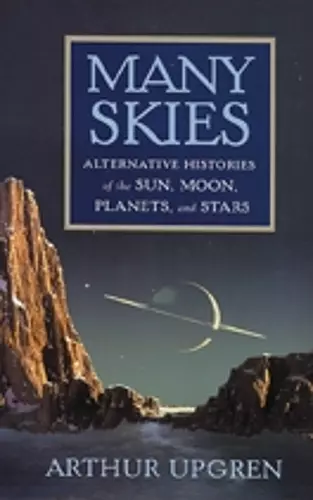Many Skies
Alternative Histories of the Sun, Moon, Planets, and Stars
Format:Paperback
Publisher:Rutgers University Press
Published:9th Apr '12
Currently unavailable, and unfortunately no date known when it will be back

What if Earth had several moons or massive rings like Saturn? What if the Sun were but one star in a double-star or triple-star system? What if Earth were the only planet circling the Sun?
These and other imaginative scenarios are the subject of Arthur Upgren's inventive book Many Skies: Alternative Histories of the Sun, Moon, Planets, and Stars. Although the night sky as we know it seems eternal and inevitable, Upgren reminds us that, just as easily, it could have been very different.
Had the solar sytem happened to be in the midst of a star cluster, we might have many more bright stars in the sky. Yet had it been located beyond the edge of the Milky Way galaxy, we might have no stars at all. If Venus or Mars had a moon as large as ours, we would be able to view it easily with the unaided eye. Given these or other alternative skies, what might Ptolemy or Copernicus have concluded about the center of the solar sytem and the Sun?
This book not only examines the changes in science that these alternative solar, stellar, and galactic arrangements would have brought, it also explores the different theologies, astrologies, and methods of tracking time that would have developed to reflect them. Our perception of our surroundings, the number of gods we worship, the symbols we use in art and literature, even the way we form nations and empires are all closely tied to our particular (and accidental) placement in the universe.
Many Skies, however, is not merely a fanciful play on what might have been. Upgren also explores the actual ways that human interferences such as light pollution are changing the night sky. Our atmosphere, he warns, will appear very different if we have belt of debris circling the globe and blotting out the stars, as will happen if advertisers one day pollute space with brilliant satellites displaying their products.
From fanciful to foreboding, the scenarios in Many Skies will both delight and inspire reflection, reminding us that ours is but one of many worldviews based on our experience of a universe that is as much a product of accident as it is of intention.
"Art Upgren not only reminds us of the simple pleasures of star gazing, he reconnects us with the generations of those who have dared to ask how it all works. Upgren's book thus carves a path along which we can reacquaint ourselves with the universe." -- Dr. Neil deGrasse Tyson * director, Hayden Planetarium *
"Upgren has produced an intriguing book. He uses 'what-if' scenarios to show how astronomical history might be changed and how current knowledge about astronomy could be applied to these situations. This book is not just for the science fiction aficionado, but for readers to ponder as they simultaneously learn astronomy. Recommended." * CHOICE *
"Many Skies offers a series of suggestions that are likely to stimulate reflection on how and why the science of astronomy developed and evolved."
* Science Books & Film *
Art Upgren not only reminds us of the simple pleasures of star gazing, he reconnects us with the generations of those who have dared to ask how it all works. Upgren's book thus carves a path along which we can reacquaint ourselves with the universe. -- Dr. Neil deGrasse Tyson * director, Hayden Planetarium *
Clearly written and easy to understand, [this] book will point you to the stars in a way that should make them lasting friends. -- David H. Levy * author of Sharing the Sky and Impact Jupiter *
Upgren has produced an intriguing book. He uses 'what-if' scenarios to show how astronomical history might be changed and how current knowledge about astronomy could be applied to these situations. This book is not just for the science fiction aficionado, but for readers to ponder as they simultaneously learn astronomy. Recommended. * CHOICE *
Arthur Upgren's marvelous look at our place in the Universe deals with profound questions. What if things didn't turn out exactly as they did-would we still be here? By studying these questions, we gain a much better appreciation of how lucky we are to enjoy life on this precious planet Earth. -- David H. Levy * co-discoverer of Comet Shoemaker-Levy 9 that collided with Jupiter, and science *
"Many Skies offers a series of suggestions that are likely to stimulate reflection on how and why the science of astronomy developed and evolved."
* Science Books & Film *
ISBN: 9780813553504
Dimensions: 229mm x 152mm x 13mm
Weight: 286g
212 pages
First Paperback Edition